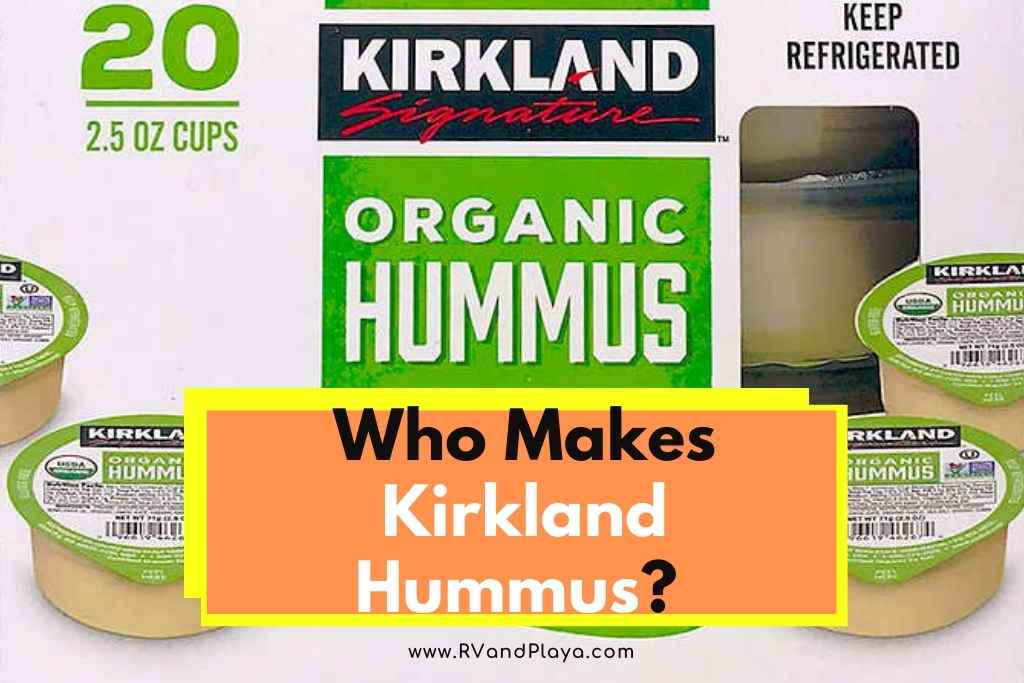Lindsey, do you know who makes Kirkland Organic Hummus? This is one of the questions our readers ask a lot. Well, we´ve got you covered.
Costco lovers have likely seen the Kirkland organic hummus available in stores across the United States. If you’re familiar with how Costco creates their Kirkland private label products you may be aware that Costco doesn’t actually manufacture any of them. So, who makes Kirkland hummus?
Unfortunately, there is no clear answer as to who manufacturers Kirkland organic hummus. All we know is that it is made in the United States and USDA certified organic. Unless Costco or the partner brand chooses to reveal the partnership we likely will never know.
In this article, we will discuss what we do know about the origins of Kirkland organic hummus and discuss the Kirkland private label in detail.
Table of Contents
What Do We Know About The Origins Of Kirkland Hummus?
Kirkland organic hummus is a fan favorite and for good reason. It is made from only a few natural ingredients and absolutely no preservatives. The ingredients include:
- Organic chickpeas,
- Water,
- Organic sesame tahini,
- Organic sunflower oil,
- Organic lemon juice,
- Organic garlic,
- Sea salt, and
- Organic cumin.
The Kirkland hummus is 100% organic and certified USDA organic and GMO free. In addition, the packaging does state that Kirkland organic hummus is “Made in the USA.”
However, this is the only information about the origin of the product that Costco provides. This does bring some peace of mind as some Kirkland products are manufactured in China. But their hummus is fully manufactured in the U.S.
Otherwise, the packing only states that the hummus is distributed by Costco Wholesale corporation, which doesn’t give us a lot to go on.
Read also>> Who Makes Kirkland Signature Products? (14 products listed!)
What Does It Mean To Be Certified USDA Organic?
If you’re unfamiliar with the requirements that USDA organic products have to adhere to in order to acquire their certification, we can explain the basics to you.
Essentially a USDA-certified organic product must be grown and processed according to federal guidelines on organic products. Some examples include the requirements around soil quality, pest control, additives, weed control, etc.
Farmers of organic produce are required to rely on only the natural substances of the product and only use physical, mechanical, or biological farming methods whenever possible.
However, all of this applies more to the single product, not the combined hummus dip. When it comes to multi-ingredient, processed food there are certain standards they must meet. For example, they can’t contain any artificial preservatives, colors, or flavors, and all of the ingredients must be organic.
Every company that produces USDA-certified organic products is monitored throughout all steps of the production process by a licensed certifier. This oversight ensures that none of the USDA rules are broken during any step and helps bring peace of mind to the consumer.
Why Doesn’t Costco Reveal The Manufacturers Behind Their Kirkland Products?
Many of us likely find it a little strange from an outsider’s perspective that Costco doesn’t reveal their partnerships for their Kirkland products. However, from a business point of view, it does make a lot of sense.
Kirkland is a billion-dollar private label, and is reportedly more successful than Hershey, Campbell soup, and Kellogg! Their success comes from their reputation. Kirkland products are known to be affordable and high quality, which draws customers in.
If Costco revealed all of their partnerships it would eliminate the illusion that they are creating with the Kirkland label. It took Costco a while to come up with the idea of their Kirkland label, considering they originally started out with more than 30 different private label products.
How Did Kirkland Begin?
Decades ago Kirkland didn’t even exist, and yet now it rakes in almost 60 billion every year.
The founder of Costco, Jim Sinegal, was the one who decided to drop the multiple private label names and figure out one name for all of their private label products. The reasoning behind this was that Sinegal wanted to create an unforgettable brand.
Kirkland signature was launched in 1995 and is now a major reason many shoppers are drawn to join Costco and pay their annual membership fees. It shows that Costco produces consistently great products and can be relied on.
What Is The Biggest Risk Of Only Carrying One Private Label?
Despite all the benefits that Kirkland brings to Costco, there is a risk to carry only one private label. If Costco does get a product wrong or the quality of Kirkland products begins to lower, shoppers will lose faith in their brand.
Since Costco only has this one brand, once shoppers lose faith it is over for them. They would have to put in a significant amount of work to overhaul the entire product line and start fresh.
Most corporations, such as
Kirkland simply can’t afford to produce poor quality products as this would tarnish their name, and Costco’s name by proxy. Most people consider Kirkland to be synonymous with Costco.
Conclusion
Although we can only say for certain that Kirkland organic hummus is made in the USA, it is still a great product.
If you are okay with a little uncertainty about where your product comes from, Kirkland hummus is a great choice for your next snack plate!
References
https://www.cnn.com/2022/02/05/business/costco-kirkland-signature/index.html
https://www.usda.gov/media/blog/2012/03/22/organic-101-what-usda-organic-label-means
Recent Posts
Lindsey, do you know who makes Kirkland frozen pizza? This is one of the questions our readers ask a lot. Well, we´ve got you covered. Costco sells two types of frozen pizza under their Kirkland...
Do you know who makes Kirkland Popcorn? this is one of the questions our readers ask a lot. Well, we´ve got you covered. The Kirkland Signature brand has been stunning consumers for years...

